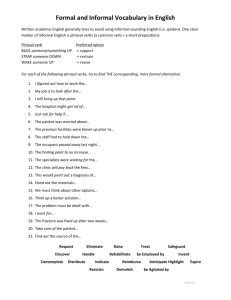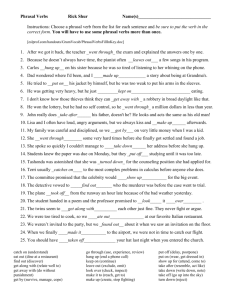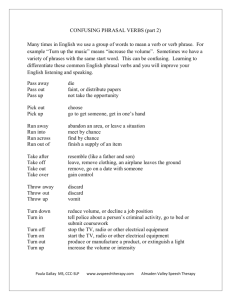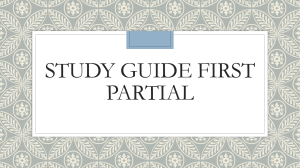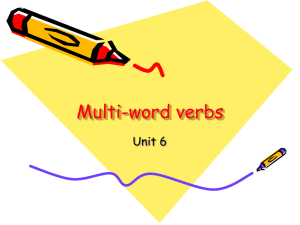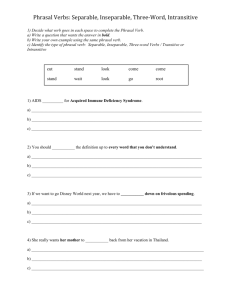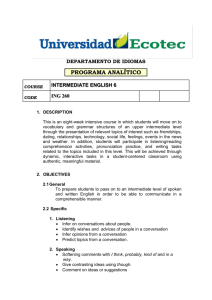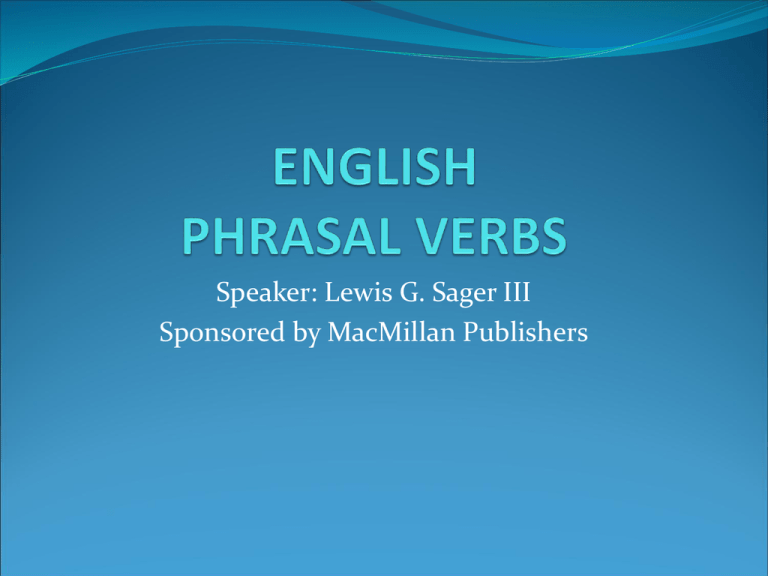
Speaker: Lewis G. Sager III
Sponsored by MacMillan Publishers
What are Phrasal Verbs?
2-word and 3-word verbs
2-word verbs:
cut up
turn on
put up
3-word verbs:
look up to
come up with
cut off
turn off
put off
put up with
catch up with
Why do phrasal verbs exist?
Phrasal verbs (separable verbs) are prevalent in Germanic languages:
German, Dutch, Danish, Swedish, Norwegian, and English.
Phrasal verbs are not very prevalent in Latin languages:
Castilian, Portuguese, Italian, French, Catalan, Romanian, etc.
Latin languages use ‘reflexive verbs’ to a great extent to express the
same ideas and concepts that we do in English with Phrasal Verbs.
Modern-day English is a combination of:
Germanic dialects, as far back as the 5th century a.d.
Viking words (invasions) from 700 to 1000 a.d.
French of the Middle Ages, thanks to the Norman
Invasion of 1066 and the Battle of Hastings.
Latin words, thanks to authors like Chaucer and
Shakespeare of the 14th and 16th centuries.
How do Phrasal Verbs work?
A phrasal verb consists of the following:
VERB + PARTICLE(S), a second or third word
Example:
I eat (verb) + up (particle)
I fell (verb) + off (particle)
I put (verb) + on (particle)
The ‘PARTICLE’ is the MOST important word. The particle
can affect, increment, enhance, reduce and/or change drastically
the meaning of the base verb.
Separable vs Non-separable 2- Word Verbs
Separable phrasal verbs have an OBJECT:
Example:
I will pick up the children.
I will pick the children up.
I will pick them up.
He puts on his shirt.
He puts his shirt on.
He puts it on.
Some 2 word verbs with objects
are NOT separable…
Examples:
Correct:
Incorrect:
I am looking for my keys.
I am looking my keys for.
Correct:
Incorrect:
He is looking at me funny.
He is looking me at funny.
Correct:
Incorrect:
The water wears through the wall.
The water wears the wall through.
There are 30 to 35 particles that can be used, we are going
to look at the 9 MOST important.
Examples:
UP
BACK
OFF
OVER
AWAY
IN
DOWN
ON
OUT
1) UP
To complete or finish an action, totally, to increase, to enhance, to increment
speak
cut
drink
eat
get
go
turn
look
2) OFF
to separate, finish, stop, disconnect, reduce, decrease
call
cut
get
turn
fall
go
put
take
3) OUT
to remove or exclude, to leave, to terminate
cut
put
get
take
throw
go
check
look
4) BACK
to return, repeat
call
turn
pay
get
come
go
give
look
5) OVER
inspect, examine, review, repeat, on top of
look
check
do
go
get
turn
run
read
6) AWAY
to put distance, continuous activity, to separate, leave, or disappear
get
go
turn
eat
look
take
give
send
7) DOWN
to reduce, lower
turn
fall
get
break
sit
lie
shoot
go
8) IN
to enter
call
get
come
give
hand
plug
put
close
9) ON
to place, touch
call
keep
put
take
turn
add
get
live
THREE-WORD PHRASALS
‘Memorize’
Get along with
have a relationship with
Keep up with
maintain up to date
Look forward to
want to do something
Catch up to
reach same place
Cut back (down) on
reduce, lower
Break into
entering to steal/rob
Look up to
admire
Look down on
condescend
Put up with
tolerate
Walk out on
abandon
Run out of
finish, use completely
Add up to
to mean, signify
Back out of
withdraw support
Feel up to
have a desire to
Run away from
escape from
Look out for
be careful of
Do away with
dispose, eliminate
Read up on
study, review
Drop out of
quit, stop
Brush up on
study, review
Face up to
confront
Literal, Figurative and Idiomatic Meanings
Put on
Burn up
Get over
Pick up
Put away
Break down
Hang up
Get into
Boil over
Literal
Figurative
Idiomatic
shirt
house
come here
shoes
store
not working
the phone
enter
kitchen
act, a play
money
cross
a cold
hide
lack of
obstacle
begin
tensions
put me on
oneself
feel better
traffic
kill
nerves
complexes
trouble
trouble
Phrasal Verbs and equivalent Single-word verbs
Ask out Break in Call off Carry on Check in Check over Clean up Come back Come in Figure out Find out Fix up Go back Go down Go up -
invite
rob, steel
cancel
continue
register
review
organize
return (here)
enter
solve
discover, realize
repair, restore
return (there)
decrease
increase
Grow up Keep on Hold back Leave out Look at Look for Look over Pass away Pick out Pick up Put away Put out Put together Show up Take out -
mature
continue
prevent
omit
observe
search
inspect, study
die
choose, select
take
store
produce
assemble
appear
remove
Phrasal Verb “Get“ and equivalent Single Verbs
Get ahead Get back Get better Get down Get in Get off Get up Get over -
advance
return
improve
descend
enter
finish (work)
rise
recuperate
Get away Get to Get by Get into Get old Get out Get well -
escape
arrive
manage
involve
age
leave
improve
IN SUMMARY
Phrasal verbs make life a lot more interesting and fun
when you speak English, and a lot more expressive.
So, next time you speak English, use a Phrasal Verb…
Brush up on Them!
They will ‘SPICE UP’ your life!
References
Hook, J.R., 2- and 3-Word Verbs, Heinle &Heinle, 1999.
Elaine Higgleton, LaRousse Guide to Phrasal Verbs, Ediciones
Larousse.
Dixson, Robert, Essential Idioms in English, Pearson-Longman,
White Plains, N.Y., 2004.
Flower, John, Phrasal Verb Organizer, Heinle & Heinle, 2002

